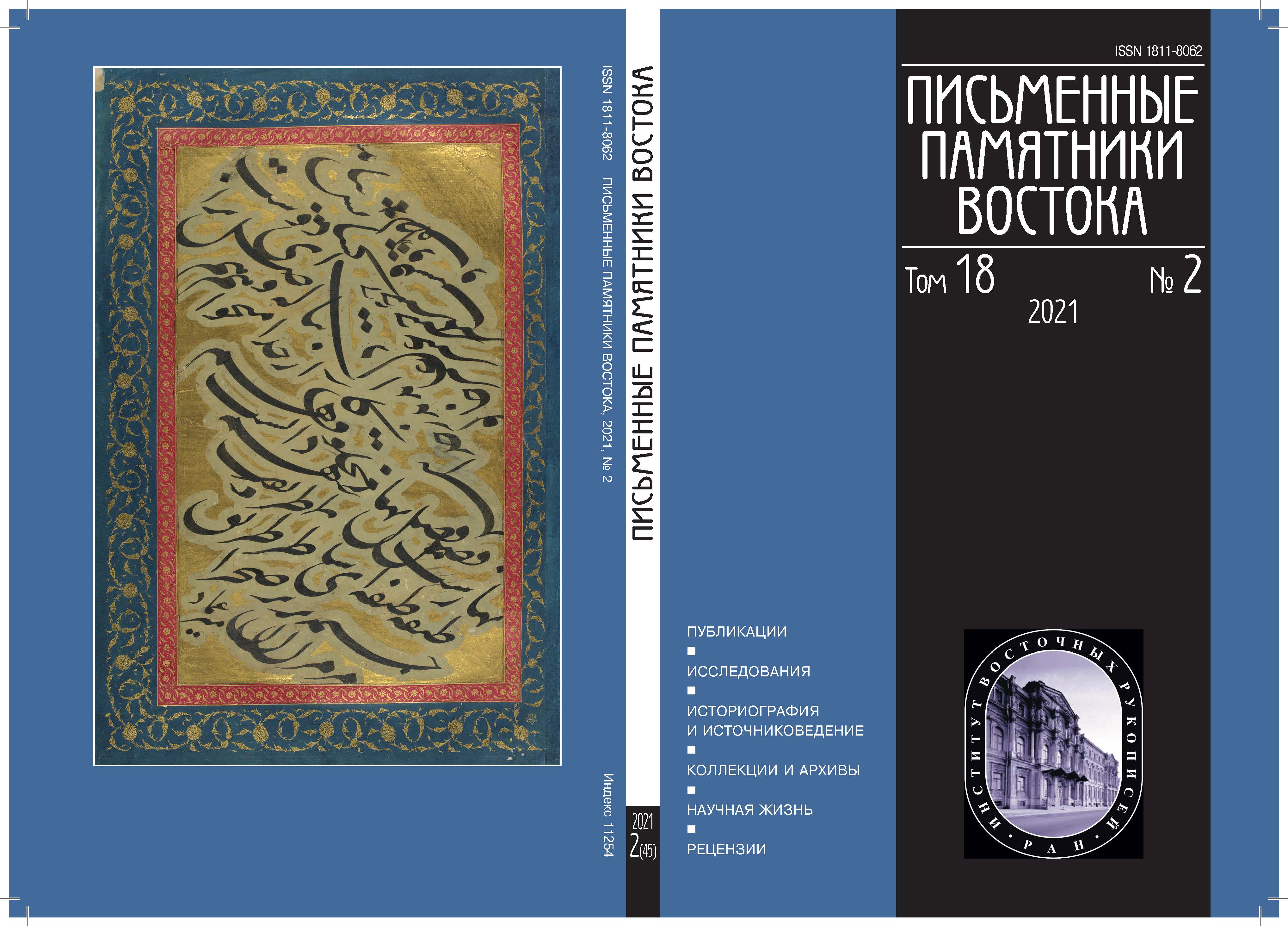“Listen to the Masters!”: An Old Uyghur Maitreya Praise
- 作者: Zieme P.1
-
隶属关系:
- Berlin-Brandenburg Academy of Sciences and Humanities
- 期: 卷 18, 编号 2 (2021)
- 页面: 64-79
- 栏目: History and historiography
- ##submission.datePublished##: 26.07.2021
- URL: https://journals.eco-vector.com/1811-8062/article/view/72176
- DOI: https://doi.org/10.17816/WMO72176
- ID: 72176
如何引用文章
全文:
详细
The veneration of Maitreya is one of the important specifics of Old Uyghur Buddhism. There are numerous praises expressing the fervent wish to meet Maitreya, the Buddha of the future. Many of these praises are written in quatrains with strophic alliteration. In this paper, three fragments of the Serindia Collection of the Institute of Oriental Manuscripts of the Russian Academy of Sciences (IOM, RAS) are published. Of special interest are some probable references to Chan Buddhism.
作者简介
Peter Zieme
Berlin-Brandenburg Academy of Sciences and Humanities
编辑信件的主要联系方式.
Email: ziemepet@gmail.com
ORCID iD: 0000-0002-8090-7707
Professor
德国, Jägerstr. 22/23 10117 Berlin参考
- Arat, Reşid Rahmeti. Eski Turk Şiiri [Old Turkic Poetry]. Ankara: Turk Tarih Kurumu Basmevi, 1965 (in Turkish).
- Clauson, Gerard. An Etymological Dictionary of Pre-Thirteenth-Century Turkish. Oxford: Oxford University Press, 1972 (in English).
- Kalinke, Viktor. Zhuangzi. Das Buch der daoistischen Weisheit. Ditzingen: Reclam, 2019 (in German).
- Legittimo, Elsa. “Synoptic Presentation of the Pusa chu tai jing (PCJ) 菩薩處胎經 the Bodhisattva Womb Sūtra. Part I”. Sengokuyama Journal of Buddhist Studies II (2005). Tokyo: Kokusai Bukkyva Womb Sūtra. Part I. Sengokuyama [International College For Postgraduate Buddhist Studies], 2005, pp. 260–150 (in English).
- Thanissaro, Bhikkhu. Merit: The Buddha's Strategies for Happiness. https://www.dhammatalks.net/Books15/Thanissaro-Bhikkhu_Merit_v130613.pdf (in English).
- Umemura, Hiroshi. “A Qočo Uyghur King Painted in the Buddhist Temple of Beshbalïq. Turfan, Khotan und Dunhuang”. In: Vorträge der Tagung “Annemarie v. Gabain und die Turfanforschung”, veranstaltet von der Berlin-Brandenburgischen Akademie der Wissenschaften in Berlin (9–12.12.1994). Berlin: Akademie Verlag, pp. 361–78 (in English).
- Wang, Youru. Linguistic strategies in Daoist Zhuangzi and Chan Buddhism. London, New York: Routledge Curzon, 2003 (in English).
- Watson, Burton. The Complete Works of Zhuangzi. New York: Columbia University Press, 2013 (in English).
- Wilkens, Jens. Buddhistische Erzählungen aus dem alten Zentralasien. Edition der altuigurischen Daśakarmapathāvadānamālā, 1–3. Berliner Turfantexte XXXVII. Turnhout: Brepols, 2016 (in German).
- Yakup, Abdurishid 阿不都热⻄提 亚库甫. Gudai weiwuer yu zanmeishi he miaoxiexing yunwen de yuwenxue yanjiu 古代维吾尔语美诗和描写性韵⽂旳语⽂学研究 [Old Uyghur Hymns, Praises, Blessings and Descriptive Poems]. Shanghai: Shanghai guji chuban she 上海古籍出版社 [Shanghai Ancient Books Publishing House], 2015 (in Chinese).
- Zieme, Peter. Notizen zum altuigurischen Chan-Gedicht “Zwölf Stunden”. https://www.academia.edu/10982339/Notizen_zum_altuigurischen_Chan_Gedicht_Zwölf_Stunden_2015 (in German).
- Zieme, Peter. “The Layman İndu and an Old Uigur Poem”. Written Monuments of the Orient, 2019, no. 10 (issue 2). Moscow: Nauka, Vostochnaia literatura, pp. 40–50 (in Russian).
补充文件











